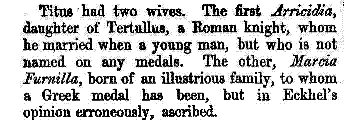Titus, 24 June 79 - 13 September 81 A.D.
Titus Flavius Vespasianus was the hero / villain of the Judean rebellion and a very popular emperor. He presided over the empire during the cataclysmic eruption of Vesuvius, which buried half the towns of the Bay of Naples, including Pompeii. He was described as handsome, charming and generous. Titus once complained that he had lost a day because twenty-four hours passed without his bestowing a gift. He was, however, generous to a fault, which depleted the treasury. If he had ruled longer, he might have brought the empire to bankruptcy and lost his popularity. He died of illness in 81 A.D., succeeded by his brother Domitian.
Insert detailed biography here
Obverse legends:
DIVOTITO
IMPERATORTCAESARAVGVSTIF
IMPTCAESARCOSIII
IMPTCAESARVESPASIANVSAVG
IMPTCAESVESPASIANAVGPM
IMPTCAESVESPAVGPMTRPCOSVIII
IMPTCAESVESPAVGPMTRPPPCOSVIII
IMPTITVSCAESVESPASIANAVGPM
IMPTITVSCAEVESPASIANVSAVGPM
IMPTVESPAVGCOSVIII
TCAESARIMPCOSIIICENS
TCAESARIMPCOSIIII
TCAESARIMPVESP
TCAESARIMPVESPASIAN
TCAESARIMPVESPASIANVS
TCAESARIMPVESPASIANVSCOSIII
TCAESARIMPVESPASIANVSCOSVI
TCAESARVESPASIANVS
TCAESIMP
TCAESIMPAVGFTRPCOSVICENSOR
TCAESIMPPONTRPCOSIICENS
TCAESIMPVESPCEN
TCAESIMPVESPCENS
TCAESIMPVESPPONTRPOT
TCAESIMPVESPPONTRPCENS
TCAESVESPASIANIMPPONTRPOTCOSIIICENS
TCAESVESPASIANIMPPTRPCOSII
Dates
Rarity of Denominations, Average Weights of Well Preserved Coins, Mints, and Other Information
Average well preserved denarius weight 3.30 grams.
Mints
Links
FORVM's Catalog
Members' Gallery
Fake Coin Reports
De Imperatoribus Romanis
Google
Discussion Board Search
Wikipedia
Wild Winds
Coin Archives
Aequitas.com
References
Titus
       | Please |help| us convert the |Dictionary of Roman Coins| from scans to text by typing the original text here. Please add updates or make corrections to the NumisWiki text version as appropriate. |
View whole page from the |Dictionary Of Roman Coins|
Titus, 24 June 79 - 13 September 81 A.D.
Titus Flavius Vespasianus was the hero / villain of the Judean rebellion and a very popular emperor. He presided over the empire during the cataclysmic eruption of Vesuvius, which buried half the towns of the Bay of Naples, including Pompeii. He was described as handsome, charming and generous. Titus once complained that he had lost a day because twenty-four hours passed without his bestowing a gift. He was, however, generous to a fault, which depleted the treasury. If he had ruled longer, he might have brought the empire to bankruptcy and lost his popularity. He died of illness in 81 A.D., succeeded by his brother Domitian.
Insert detailed biography here
Obverse legends:
DIVOTITO
IMPERATORTCAESARAVGVSTIF
IMPTCAESARCOSIII
IMPTCAESARVESPASIANVSAVG
IMPTCAESVESPASIANAVGPM
IMPTCAESVESPAVGPMTRPCOSVIII
IMPTCAESVESPAVGPMTRPPPCOSVIII
IMPTITVSCAESVESPASIANAVGPM
IMPTITVSCAEVESPASIANVSAVGPM
IMPTVESPAVGCOSVIII
TCAESARIMPCOSIIICENS
TCAESARIMPCOSIIII
TCAESARIMPVESP
TCAESARIMPVESPASIAN
TCAESARIMPVESPASIANVS
TCAESARIMPVESPASIANVSCOSIII
TCAESARIMPVESPASIANVSCOSVI
TCAESARVESPASIANVS
TCAESIMP
TCAESIMPAVGFTRPCOSVICENSOR
TCAESIMPPONTRPCOSIICENS
TCAESIMPVESPCEN
TCAESIMPVESPCENS
TCAESIMPVESPPONTRPOT
TCAESIMPVESPPONTRPCENS
TCAESVESPASIANIMPPONTRPOTCOSIIICENS
TCAESVESPASIANIMPPTRPCOSII
Dates
Rarity of Denominations, Average Weights of Well Preserved Coins, Mints, and Other Information
Average well preserved denarius weight 3.30 grams.
Mints
Links
FORVM's Catalog
Members' Gallery
Fake Coin Reports
De Imperatoribus Romanis
Google
Discussion Board Search
Wikipedia
Wild Winds
Coin Archives
Aequitas.com
References
Titus
       | Please |help| us convert the |Dictionary of Roman Coins| from scans to text by typing the original text here. Please add updates or make corrections to the NumisWiki text version as appropriate. TÎTVS (Flavius Vespasianus), eldest son of the emperor Vespasian by Domitilla, was born at Rome in the year v.c. 794 (Dec. 30th, A.D. 41).-- Although brought up along with Britannicus, in the same licentious court where Nero's vicious propensities were nurtured, and not uncontaminated with its seductions, his docility in education saved him from utter ruin. Assisted in his devoted application to study by an extra- ordinary memory he was eloquent in speech, and felicitous in poetical composition. Skilful and adroit in gymnastic and equestrian exercises, his warlike courage and his moral firmness were early displayed. Possessing the ability to execute, as well as the judgment to form great designs, he proved himself, often amidst the severest trials and under the most disastrous circumstances, one of the first commanders of his time. To the loftiest qualities of genius there were, in his character conjoined a sweetness of temper and an affability of manners, that might truly be said to have won for him "golden opinions" from people of every sort and condition. Whilst yet a mere youth Titus began his military career in Germany; he afterwards served in Britain: in both those countries he was the companion and pupil of his father; and in the latter theatre of sanguinary warfare he gave a signal proof at once of his intrepdity and his filial affection, by rescuing Vespasian from a situation of the most imminent peril. On his return to Rome he was promoted by Nero from the rank of tribune to that of prefect, and to the command of a legion. Following his father to the Jewish war he successively planted the Roman eagles on the walls of Tarich¿a and Gamala, two strong cities of Jud¿a.-- At the end of the year v.c. 821 (A.D. 69) he went on a mission from Vespasian to salute Galba, when, hearing of the murder of that emperor, and of the aspiring movements of Vitellius, he opportunely halted, and returned to his father. |
View whole page from the |Dictionary Of Roman Coins|